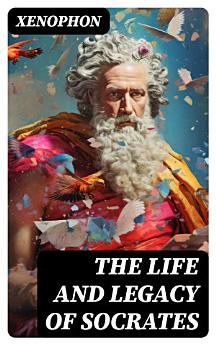The Life and Legacy of Socrates: Xenophon's Memoires of Socrates and His Teachings: Memorabilia, Apology, The Economist, Symposium...
Nov 2023 · DigiCat
Ebook
502
Pages
family_home
Eligible
info
reportRatings and reviews aren’t verified Learn More
About this ebook
In "The Life and Legacy of Socrates," Xenophon presents a compelling narrative that intertwines historical biography with philosophical discourse, encapsulating the essence of Socratic thought and its enduring impact on Western philosophy. Through a series of dialogues and reflections, Xenophon not only details the life of Socrates but also explores his method of questioning and philosophical inquiry, often contrasting it with the societal norms of his time. The text is notable for its accessible style, rich anecdotes, and the author's firsthand experiences, making it a vital source for understanding Socrates' character and the philosophical landscape of ancient Athens. Xenophon, a contemporary and student of Socrates, offers a unique perspective shaped by his military background, experiences in Athenian politics, and personal dialogues with Socrates. His writings reveal not only his admiration for Socratic ideals but also his desire to preserve the teachings and legacy of a man who profoundly influenced the intellectual heritage of the West. Xenophon's portrayal is marked by a focus on moral character and practical wisdom, reflecting his own values and philosophical inclinations. This book is highly recommended for readers interested in the foundations of Western philosophy, as well as those seeking a nuanced portrait of one of history's most influential figures. Xenophon's work acts as both a tribute and a critical examination of Socratic thought, making it an essential read for anyone looking to engage with the philosophical inquiries that continue to resonate today.
About the author
Xenophon (circa 430 – 354 BC) was an ancient Greek philosopher, historian, soldier, and student of Socrates. As a historian, Xenophon is known for his writings on the history of his own times, the sayings of Socrates, and the life of ancient Greece. His most famous works include 'Anabasis', his account of the expedition of Cyrus the Younger and the retreat of the Ten Thousand, 'Hellenica', which is a continuation of Thucydides's history up to the Battle of Mantinea, and 'Cyropaedia', an imaginative account of Cyrus the Great's education and reign. His literary style is straightforward and practical; it is marked by clarity and lacks the ornamentation that was common among many of his contemporaries. Xenophon's 'The Life and Legacy of Socrates' stands out as a significant contribution to Socratic literature and provides a complementary view of the philosopher that differs from that of Plato, whom Xenophon had known personally. In this work, Xenophon offers personal reminiscences and a portrayal of Socrates's ethical teachings, emphasizing his practical wisdom and his method of inductive reasoning. Through his writings, Xenophon became one of the primary sources of information on Socratic philosophy, and his works continue to be studied for their historical and philosophical value. His contributions to literature and the understanding of Greek culture are considered invaluable by scholars and historians.
Rate this ebook
Tell us what you think.
Reading information
Smartphones and tablets
Install the Google Play Books app for Android and iPad/iPhone. It syncs automatically with your account and allows you to read online or offline wherever you are.
Laptops and computers
You can listen to audiobooks purchased on Google Play using your computer's web browser.
eReaders and other devices
To read on e-ink devices like Kobo eReaders, you'll need to download a file and transfer it to your device. Follow the detailed Help Center instructions to transfer the files to supported eReaders.








